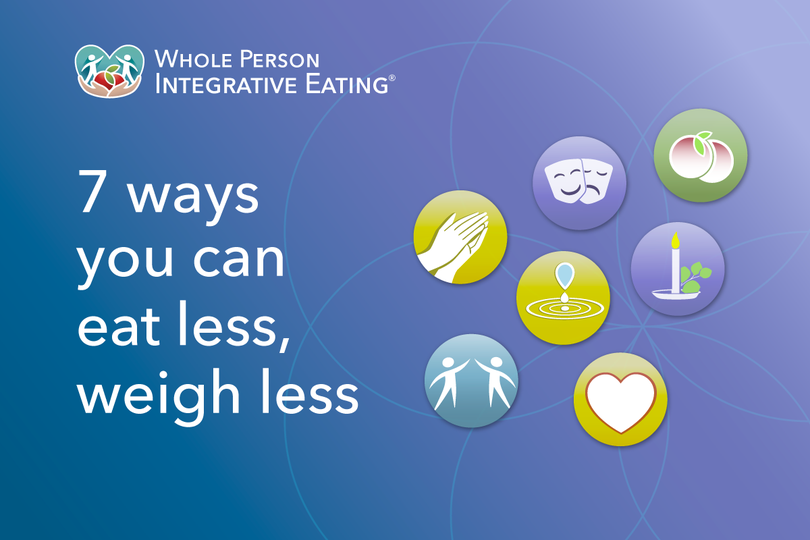Here’s a 7-step, action-filled toolkit to overcome overeating and weight gain.
During the holiday season…and beyond.
— By Deborah Kesten, VIP Contributor at Thrive Global
Losing weight and eating healthfully are two of the most popular New Year’s resolutions. It’s understandable, because millions of us struggle to overcome overeating and overweight, often without success.
What if you never again need to make a New Year’s resolution to lose weight or ‘go on a diet’ because your most-of-the-time way of eating empowers you to eat less and weigh less throughout the year?
The science-backed Whole Person Integrative Eating® (WPIE) program I founded with behavioral scientist Larry Scherwitz, PhD, is reshaping our understanding of what to eat (food choices) and also of how to eat (eating behaviors) for weight loss and well-being. In a study we did with 5,256, we identified seven new-normal patterns of eating linked with overeating and overweight (we call them ‘overeating styles’). And seven Whole Person Integrative Eating remedies associated with eating less and weighing less. Without dieting.
Your 7-Step, Action-Filled, WPIE Toolkit
Here are the seven overeating styles and the WPIE antidotes we discovered.
WHAT TO EAT (Food Choices)
#1. Get fresh.
To eat less and weigh less, choose fresh, whole food in its natural state as often as possible. This means a diet of mostly plant-based foods (fruit, veggies, whole grains, legumes, nuts, seeds), with small or few servings of fresh, unprocessed animal-based foods (dairy, fish, poultry, meat). This is the opposite of the WPIE Fast Foodism overeating style—which includes mostly fast, ultra-processed, and animal-based foods that lead to overweight and other diet-linked chronic conditions.
HOW TO EAT (Eating Behaviors)
#2. Positive emotions.
If you turn to high-carb, high-fat, high-sugar food when you experience negative emotions, such as anxiety, depression, or anger, it’s likely the overeating style of Emotional Eating is the key reason you overeat and gain weight. The antidotes: Be aware of feelings and thoughts before, during, and after eating. And enjoy food while filled with positive emotions, such as gratitude, serenity, and joy.
#3. Moment-to-moment mindfulness.
Eating while doing other things—working at your computer, watching TV, driving, etc.—is the Task Snacking WPIE overeating style. To eat less and weigh less, bring moment-to-moment nonjudgmental awareness to every aspect of the meal.
#4. Heartfelt gratitude.
The Food Fretting WPIE overeating style means you are often over-concerned about the ‘best’ way to eat; or you diet a lot, and count calories, carbs, or fat grams. To up the odds of weight loss and well-being, replace ‘in your head’ Food Fretting with the antidote: Appreciate food and its origins—from the heart.
#5. Loving regard.
Larry and I were surprised to discover that the Sensory Disregard overeating style—not taking time to enjoy the colors, flavors, aroma, and sensory elements of the dining experience—is associated with eating more and weighing more. The remedy: Savor and ‘flavor’ your food with loving regard.
#6. Appetizing atmosphere.
Both an emotional and aesthetic Unappetizing Atmosphere was another unexpected, surprising overeating style. This means that eating while, say, someone nearby is arguing; or you’re munching a muffin while pumping gas, the unpleasant emotional and aesthetic environment may contribute to overeating and weight gain. The solution: Eat in pleasing emotional and aestheticsurroundings.
#7. Share fare.
More and more research links the Solo Dining WPIE overeating style with eating lots of fast, processed food and obesity. The antidote: Eat with others as often as possible—perhaps by taking online food breaks or sharing virtual or ‘in person’ meals with friends, coworkers, or family members.
The Takeaway
To reap the rewards of Whole Person Integrative Eating, think of it as your scientifically sound, personal guide to eating less and weighing less throughout 2024…and beyond. And consider the seven WPIE ‘ingredients’ as a lifetime practice—an all-star team of food choices and eating behaviors—you get better and better at with each meal. When you do, you may make a ‘go-on-a-diet’ New Year’s resolution unnecessary and obsolete.
For more about Whole Person Integrative Eating, please visit https://integrativeeating.com.


